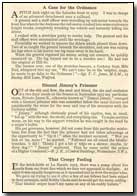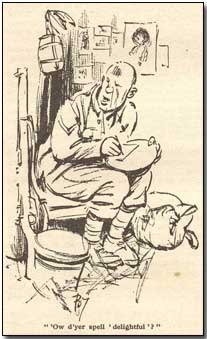Memoirs & Diaries - The Best 500 Cockney War Stories - Dismal Jimmy's Prisoner and Other Stories
 Published in London
in 1921, The Best 500 Cockney War Stories
comprised, in the words of its newspaper publisher (The London Evening
News) "a remembering and retelling of those war days when laughter
sometimes saved men's reason".
Published in London
in 1921, The Best 500 Cockney War Stories
comprised, in the words of its newspaper publisher (The London Evening
News) "a remembering and retelling of those war days when laughter
sometimes saved men's reason".
The collection of short memoirs, some 500 in total, is divided into five categories - Action, Lull, Hospital, High Seas and Here and There. This page contains five stories from Action, led by Dismal Jimmy's Prisoner.
Other sections within the collection can be accessed using the sidebar to the right.
Dismal Jimmy's Prisoner
Out of the ebb and flow, the mud and blood, the din and confusion of a two days' strafe on the Somme in September 1917 my particular chum, Private James X., otherwise known as "Dismal Jimmy," emerged with a German prisoner who was somewhat below the usual stature and considerably the worse for the wear and tear of his encounter with the Cockney soldier.
"Jimmy," although obviously proud of his captive, was, as usual, "fed up" with the war, the strafe, and everything else. To make matters worse, on his way to the support trenches he was caught in the head by a sniper's bullet.
His pet grievance, however, did not come from this particular misfortune, but from the fact that the prisoner had not taken advantage of the opportunity to "'Op it!" when the incident occurred.
"Wot yer fink ov 'im, mate?" he queried. "Followed me all rahnd the blinkin' trenches, 'e did! Thinks I got a bit o' tripe on a skewer, maybe, th' dirty dog!" "Jimmy" muttered.
Then he came under the orders of a Higher Command.
H. J. R., 1 Central Buildings, Westminster, S.W.1
That Creepy Feeling
In the brick-fields at La Bassee, 1915, there was a pump about five yards from our front line which we dare not approach in daylight. At night it was equally dangerous as it squeaked and so drew the sniper's fire.
We gave up trying to use it after a few of our fellows had been sniped in their attempts, until Nobby Clarke said he would get the water, adding: "That blinkin' sniper hasn't my name on any of his ruddy bullets."
After he had gone we heard the usual squeak of the pump, followed by the inevitable ping! ping!
We waited. No Nobby returned.
Two of us crawled out to where he lay to bring him in.
" Strewth, Bill," he cried when my mate touched him, "you didn't 'arf put the blinkin' wind up me, creepin' aht like that!"
There he lay, on his back, with a piece of rope tied to the handle of the pump. We always got our water after that.
F. J. Pike (late 2nd Grenadier Guards), 4 Hilldrop Road, Bromley, Kent
"Toot-Sweet," the Runner
Scene: Before Combles in the front line.
Position: Acute.
Several runners had been despatched from the forward position with urgent messages for Headquarters, and all had suffered the common fate of these intrepid fellows.
One Cockney named Sweet, and known as "Toot-Sweet" for obvious reasons, had distinguished himself upon various occasions in acting as a runner.
A volunteer runner was called for to cover a particularly dangerous piece of ground, and our old friend was to the fore as usual.
"But," said the company officer, "I can't send you again - someone else must go."
Imagine his astonishment when "Toot-Sweet" said, "Giv' us this charnce, sir. I've got two mentions in dispatches now, an' I only want annuvver to git a medal."
He went, but he did not get a medal.
E. V. S. (late Middlesex Regt.), London, N.W.2
Applying the Moral
Before we made an attack on "The Mound of Death," St. Eloi, in the early part of 1916, our Brigadier-General addressed the battalion and impressed upon us the importance of taking our objective.
He told us the tale of two mice which fell into a basin of milk. The faint-hearted one gave up and was drowned. The other churned away with his legs until the milk turned into butter and he could walk away!
He hoped that we would show the same determination in our attack.
We blew up part of the German front line, which had been mined, and attacked each side of the crater, and took the position, though with heavy losses.
On the following day one of my platoon fell into the crater, which, of course, was very muddy. As he plunged about in it he shouted "When I've churned this ruddy mud into concrete I'm 'opping aht of it."
This was the action in which our gallant chaplain, Captain the Rev. Noel Mellish, won the V.C.
"Reg. Bomber," 4th Royal Fusiliers, 3rd Division
Spelling v. Shelling
An attack was to be made by our battalion at Givenchy in 1915. The Germans must have learned of the intention, for two hours before it was due to begin they sent up a strong barrage, causing many casualties.
Letters and cards, which might be their last, were being sent home by our men, and a Cockney at the other end of our dug-out shouted to his mate, "'Arry, 'ow dyer spell 'delightful'?"
H. W. Mason (late 23rd London Regt.), 26 Prairie Street, Battersea, S.W.
Next - Too Much Hot Water and four other stories
A 'whizzbang' was a high-velocity, low-trajectory shell that made a shrill approach noise and then a sharp explosive report.
- Did you know?

